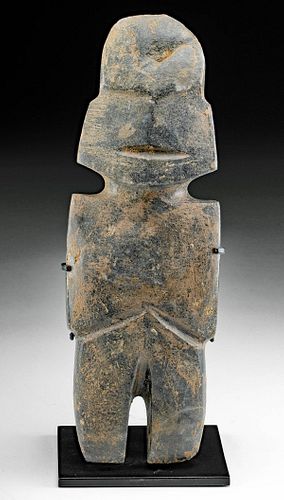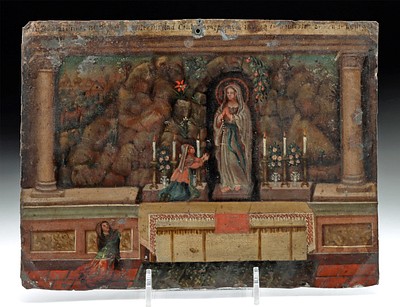Tall Guerrero Mezcala Andesite Axe God
Lot 106
About Seller
Artemis Fine Arts
686 S Taylor Ave, Ste 106
Louisville, CO 80027
United States
Selling antiquities, ancient and ethnographic art online since 1993, Artemis Gallery specializes in Classical Antiquities (Egyptian, Greek, Roman, Near Eastern), Asian, Pre-Columbian, African / Tribal / Oceanographic art. Our extensive inventory includes pottery, stone, metal, wood, glass and textil...Read more
Estimate:
$5,000 - $7,500
Absentee vs Live bid
Two ways to bid:
- Leave a max absentee bid and the platform will bid on your behalf up to your maximum bid during the live auction.
- Bid live during the auction and your bids will be submitted real-time to the auctioneer.
Bid Increments
| Price | Bid Increment |
|---|---|
| $0 | $25 |
| $300 | $50 |
| $1,000 | $100 |
| $2,000 | $250 |
| $5,000 | $500 |
| $10,000 | $1,000 |
| $20,000 | $2,500 |
| $50,000 | $5,000 |
| $100,000 | $10,000 |
| $200,000 | $20,000 |
About Auction
By Artemis Fine Arts
Jun 15, 2023
Set Reminder
2023-06-15 10:00:00
2023-06-15 10:00:00
America/New_York
Bidsquare
Bidsquare : VARIETY Ancient, Ethno, Native American, Fine Art
https://www.bidsquare.com/auctions/artemis-gallery/variety-ancient-ethno-native-american-fine-art-12990
Antiquities, ethnographic, native american and fine art from cultures encompassing the globe. Artemis Fine Arts info@artemisgallery.com
Antiquities, ethnographic, native american and fine art from cultures encompassing the globe. Artemis Fine Arts info@artemisgallery.com
- Lot Description
Pre-Columbian, Mexico, Guerrero, Mezcala culture, ca. 500 to 200 BCE. An impressively sizeable, hand-carved and string-cut, deep grey-green stone (probably andesite) depicting a standing anthropomorphic axe god figure, the human physiognomy displaying appealing stylization. The ancient artisans of this region were particular adept at reducing the human body to simple, eloquent forms via a string cut technique. Note the dramatically tapered head, cut separation between the legs, and abstract facial features that ironically appeal to a modernist taste for minimalism. Size: 3.5" W x 10.5" H (8.9 cm x 26.7 cm); 10.75" H (27.3 cm) on included custom stand.
The form of this figure fits somewhere between and M-8 type -with its broader, flatter face, sloping cheek planes that meet in the central vertical ridge which suggests a nose, and the flatter temporal region- and an M-10 type, which according to expert Carlo Gay showed significant changes advancing them over the previous four types. For instance, note how the flat plane across the lower section of the face is an uninterrupted area as opposed to the narrow, slit mouth of earlier figures. According to Gay, "At its best, the M-10 type epitomizes Mezcala sculpture, representing an optimal solution to carving a viable portrayal of the human figure in an intractable material and with simple tools." (Carlo Gay, Mezcala Ancient Stone Sculpture from Guerrero Mexico. New York: Balsas Publications, 1992 p. 51). For a similar example, see plate 33 on p. 51 of Gay's text.
Provenance: private Stillwater, Minnesota, USA collection, purchased in November 2020; ex-Artemis Gallery; ex-private Hawaii, USA collection; ex Ketteler Collection, Germany
All items legal to buy/sell under U.S. Statute covering cultural patrimony Code 2600, CHAPTER 14, and are guaranteed to be as described or your money back.
A Certificate of Authenticity will accompany all winning bids.
We ship worldwide and handle all shipping in-house for your convenience.
#179253Expected surface wear with old chips/abrasions to head and other high pointed areas as shown. Earthen deposits grace the surface as well.Condition
- Shipping Info
-
All shipping is handled in-house for your convenience. Your invoice from Artemis Gallery will include shipping calculation instructions. If in doubt, please inquire BEFORE bidding for estimated shipping costs for individual items.
-
- Buyer's Premium



 EUR
EUR CAD
CAD AUD
AUD GBP
GBP MXN
MXN HKD
HKD CNY
CNY MYR
MYR SEK
SEK SGD
SGD CHF
CHF THB
THB














